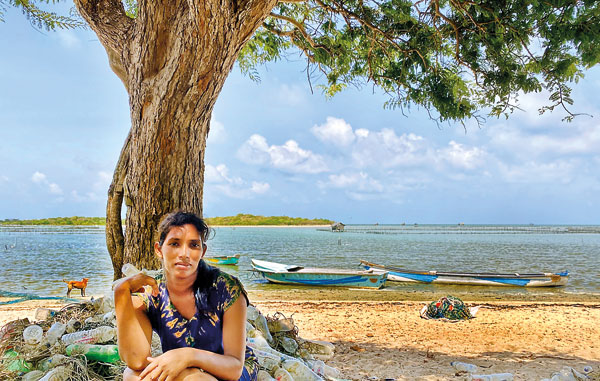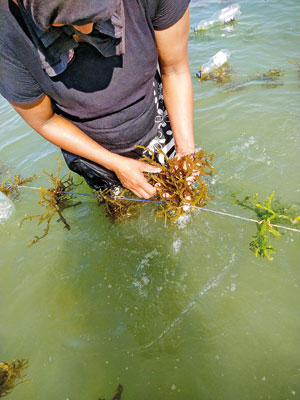News
Seaweed farming tangled in bureaucracy, politicisation
View(s):By Mimi Alphonsus
When the war widows of Valaipadu returned to their village in 2010 after over a year of displacement, they did not think there would be much opportunity awaiting them. But an unusual new product would soon transform their lives: seaweed.
Seaweed farming is relatively straightforward. Nursery plants are grown for 45 days in shallow waters before being dried, dusted and packed. In Valaipadu, hundreds of plastic bottles bob in the ocean marking the ropes that the mostly-women farmers tied near the coast. Bringing in Rs. 40-50,000 a month on average, with little input costs, seaweed has provided much needed livelihood options to female-headed households. But while the ocean may seem infinite, thecoast is not, and licensing issues have made the business far more complicated.
Seaweed farming has been promoted by the government for its environmental benefits of storing carbon and serving as a nutritional breeding ground for fish. But cultivation only began in Valaipadu in 2012 when a private company provided women with ropes and nursery plants to begin production. The village now produces about 150 tons of seaweed each year, mostly sold to Indian exporters, but it wasn’t until 2018 that the farms started to be regulated. Now farmers must get a one-year aquaculture licence to start their farms but obstacles in the process have led to delays and difficulties.

Prasanthini: A seaweed farmer facing a sea of hurdles
“We had to apply to National Aquatic Development Authority (NAQDA) after which we had to go to so many departments–Fisheries, Divisional Secretariat Office–for multiple approvals,” said Prasanthini, a seaweed farmer since 2019. Valaipadhu is one of the most rural villages in Sri Lanka, with only two buses running to and from it each day. Trips to NAQDA and other government departments in Pooneryn or Kilinochchi town, 30km and 60km away respectively, often take the whole day. “It was so difficult,” said Prasanthini. “So NAQDA finally agreed to group the applications together and seek approval.”
The long and costly bureaucracy involved in obtaining a licence has led to farmers trusting individual government officials, exporters, and NGOs to facilitate licensing on their behalf. So far, no plan is underway to ease the process and to ensure that beneficiaries can obtain licences independently. 
Prasanthini applied in August 2021 and to date has not got her permit. Although this has not stopped her, she and other farmers like her are vulnerable without licences. “People steal the seaweed, but we can’t do anything about it because we don’t have a licence,” said a widow with two school-going children who requested not to be named. “And the sea cucumber farmers also encroach into our area pushing us further out to sea which is difficult for women without husbands and boats to access.”
Minus a licence, farmers have no authority with which to protect their livelihood or take out business loans. Furthermore, they must rely on the few exporters who have been buying seaweed prior to the introduction of regulations, effectively creating a monopsony. A committee member of the local Seaweed Cooperative Society said they want at least two more buyers to improve competition and better negotiate prices.
On the other hand, some villagers view the licence as more trouble than it’s worth. “We don’t get subsidies, compensation or anything from the government,” said one widowed farmer who did daily wage work before switching to seaweed. “Sometimes I wonder if there’s any point to hassling over this licence in the first place.”
The licence delay issue is shrouded in mystery and accusations of politicisation. The Sunday Times found that, in the beginning, local officials had delayed visiting proposed seaweed lots and faced pressure from fishermen and other officials opposed to the farms. According to an officer at the Ministry of Fisheries who requested anonymity, such problems are common wherever there is diversified ocean economies and long-term solutions require clear demarcating lands for different uses.
However, further delays took place when NAQDA requested the National Aquatic Resources Research and Development Agency (NARA)to map the area and provide a feasibility report. In March this year, NARA surveyed for the 300 seaweed applications in Valaipadhu but left abruptly without completing the study. Officials at NARA, requesting not to be named, said that the work was temporarily halted on the request of the Minister of Fisheries. They say that turf wars with sea cucumber farmers and fishermen may have led to this decision.
Repeated attempts to contact Minister Douglas Devananda failed.
But while internal conflicts exist, particularly due to early opposition from men in the village, most farmers the Sunday Times spoke to believe politicisation is more the reason for delays. The Fishermen’s Cooperative Society in Valaipadhu maintain that they have been supportive and have submitted consent to the Department of Fisheries and Aquatic Resources to issue licences to seaweed farmers. They claim that it was the village’s opposition to the establishment of a Tokyo Cement factory in the area that is leading to “punishment” delays.
Villagers have been opposing the project for some time, but things escalated last month when villagers booed and turned back Minister Devananda when he came to open the cement factory.
Plans are also underway for private companies to operate farms and Sunday Times learned definitively of at least one proposal for a private seaweed farm in Palaitivu. While everyone from NAQDA, to NARA, to the International Labour Organisation hail seaweed farming as a form of self-employment for women, officials say that private farms are being prioritised in the bureaucracy. “They don’t have licences yet,” said one official, “but it’s going so much faster and we can guess why that is.”
Meanwhile, seaweed farmers suffered yet another blow when unusually high temperatures destroyed about 80% of the crop in February. Heat stress is becoming increasingly common across South Asia because of climate change but without government support seaweed farmers bear the liability of crop failure on their own.
Thankfully, community support, particularly from other women, has helped mitigate risk. “I lost all my seaweed,” explained Prasanthini, “and have just submitted a letter requesting a Rs. 50,000 loan from our women’s self-help group to buy new ropes and nursery plants to begin again.”
Farmers shared that women come to help each other on farms once they have finished managing their own, often for a wage, but sometimes for free. Others say they transport widows who don’t have boats during the harvest and to help them access difficult areas.
The best way to say that you found the home of your dreams is by finding it on Hitad.lk. We have listings for apartments for sale or rent in Sri Lanka, no matter what locale you're looking for! Whether you live in Colombo, Galle, Kandy, Matara, Jaffna and more - we've got them all!

